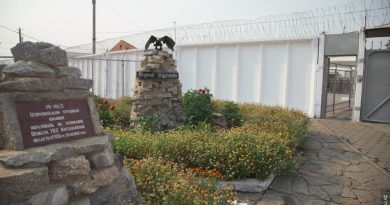Expert: there are no political prisoners in Kazakhstan, but they are
In the coming days, a meeting of the Expert council of human rights defenders will be held in Kazakhstan. It will once again revise and supplement the list of political prisoners of the country, which currently includes about twenty people. ACCA was informed about this by one of the members of the Expert council – the head of the Kazakhstan International Bureau for Human Rights (KIBHR) Yevgeny Zhovtis. Meanwhile, Vice Minister of Justice of Kazakhstan Akerke Akhmetova officially stated at a recent press conference that there is not a single political prisoner in the country.
Trying to gain an understanding of this contradiction, the ACCA journalist spoke to Yevgeny Zhovtis.
– Yevgeny Aleksandrovich, according to Vice Minister of Justice Akhmetova, we have no political prisoners. However, in March of this year, the Expert council expanded the list of political prisoners …
– And we are going to add it in the near future!
– How to understand this contradiction?
– The answer to this question lies in the legal and political and legal planes. If we consider the statement of the Vice Minister of Justice from a legal point of view, then she is right! Since there is no concept of “political prisoner” in our legislation, then they probably are not. There is no such term. But, the problem is that the absence of a term doesn’t mean the absence of the phenomenon itself. As you know, the Soviet Union also didn’t recognize the presence of political prisoners. However, at the same time, when the USSR ceased to exist, independent Kazakhstan adopted the law “On victims of political repressions”, thus recognizing that in the USSR there were: a) political repressions; b) persons who, as a result of these political repressions, were placed in prisons and psychiatric clinics; c) that they were political prisoners. Moreover, we have a presidential decree, which says about granting political asylum. It’s clear that political asylum was granted to persons who were persecuted for political reasons in the countries from which they fled, and, accordingly, in those countries they could be in places of deprivation of liberty and be called political prisoners. Therefore, the term “political prisoner” is political and legal, not purely legal. And they – “political prisoners” – exist, whether the Vice Minister of Justice wants to admit it or not. Formally, this term cannot be found in the legislation, but they are in fact. And in order to establish who they are and how to determine whether a given prisoner is political, there are some criteria for this – both international, developed by the Council of Europe, and our national ones, which we have developed ourselves on the basis of international criteria. You can get acquainted with them on our website, where information about political prisoners is published. The list of political prisoners in Kazakhstan is growing. These are people to whom the purely political Article 174 of the Criminal Code (Incitement to social, national, tribal, racial, class or religious hatred) applies, as well as Article 405 (Organization and participation in the activities of a public or religious association or other organization after a court decision, banning their activities, or liquidation in connection with the implementation of extremism or terrorism) – under this article, in most cases, people are prosecuted for expressing their own opinion; or articles that can be applied politically motivated. For example, Article 256 (Propaganda of terrorism or public calls to commit an act of terrorism) and so on. So it’s easy enough to identify a political prisoner.
– How many political prisoners are there in Kazakhstan today?
– I will not say for sure, because the list is constantly being updated, but somewhere around twenty people.
– You mentioned that the list will be added in the near future. Who will be included in it?
– For now, I cannot say it. The decision on inclusion in the list is made by the Expert council by consensus. That is, all members of the council should support the inclusion of a person in this list. But I can say that these are again persons prosecuted and in custody, in respect of whom no sentences have been passed yet, who have been charged under Article 405 (for participation in banned organizations). Here, we are talking about the banned political movements “Democratic Choice of Kazakhstan” (DCK) or “Koshe Partiyasy”.
– Do I understand correctly: this list includes persons who have already been convicted or are under investigation, but doesn’t include those who participate in the rallies, as Vice Minister Akhmetova spoke about?
– I propose to divide your question into three parts.
(1) The list of political prisoners includes those who are in custody. This is not a list of persons persecuted for political reasons. There are a large number of those convicted under Article 405 who have not been sentenced to imprisonment. There are also people who are under investigation, but they are under house arrest or under recognizance not to leave. We don’t include such people in the list of political prisoners, because the term “prisoner” itself means that a person is in custody – either before and during the trial, or after the sentencing.
(2) As for the participants in peaceful assemblies, usually Article 400 of the Criminal Code (Violation of the order of organizing and holding assemblies, rallies, pickets, street marches and demonstrations) doesn’t apply to them. They are not prosecuted, because there is no corpus delicti. They are usually prosecuted under Article 488 of the Administrative Code (Violation of the procedure for organizing and conducting peaceful assemblies) – they are issued fines, or they are given an administrative arrest.
(3) As for the criminal prosecution, the participation in peaceful assemblies is used as evidence that this person takes part in the activities of these very organizations banned by the court. If, for example, the leader of the banned DCK calls on people to go to a rally and a person goes to this rally, then by detaining him/her at this rally, law enforcement agencies, in addition to bringing him/her to administrative responsibility, can use this as evidence that he/she is participating in the activities of a banned organization. This is the context in which it’s usually considered. And, thank God, people are not being prosecuted directly for participation in a rally.
– Akerke Akhmetova said at the press conference, “There are no political prisoners in Kazakhstan, but there are criminals who have committed criminal acts.” Journalists inquired whether those, who participated in unauthorized rallies, are considered persons who have committed criminal acts. She replied, “If the rallies are not sanctioned, then they violate the law on rallies.” But, according to the law, if I’m not mistaken, rallies don’t require permission, a simple notification is enough …
– No.
– That is, permission to hold rallies is still required?
– Different words are used there. There is no word “permission”, but there is the word “agreement”. Approval is required for a demonstration or procession. You must apply to hold a demonstration or procession for a specific time and this time must be agreed. Relatively speaking, agreement in this case is equivalent to permission. There are also rallies and pickets. In this case, we are really talking about a notification. The problem is that even if you have notified, you cannot immediately go out to the rally after that. Firstly, it’s necessary to notify no later than five working days before the meeting. And secondly, you must wait for a response from government agencies within three days, which may refuse to give you this very notification, and, consequently, in carrying it out. If you didn’t receive a response within three days or received a positive response, then you can go to the rally, but only on the fifth day after the notification was submitted. Therefore, the notification is also very similar to the permissive procedure.
– It turns out a logical inconsistency: unauthorized means prohibited. However, notification is not the same as permission.
– Of course, you are absolutely right. And you use the word “inconsistency”, and I call it “slyness”. This is such a sly wording. In words, it turns out that this is a notification, but in fact we are talking about permission.
– That is, the principle “everything that is not prohibited is allowed” doesn’t work for us?
– Of course, it doesn’t work, because you can always prohibit. It works only in that part (and our authorities are proud of it), this is that if you haven’t received an answer within three days, then we can wait no longer and go to the rally on the fifth day. And our authorities believe that this is the triumph of democracy.
– Let’s return to political prisoners, who don’t officially exist in our country. What should be done so that they really don’t exist?
– We need to do three things that were recommended to the authorities of Kazakhstan by local human rights activists, experts from the UN Human Rights Committee, and experts from some other international structures.
(1) We should revise Articles 174 and 405 and bring them in line with international standards, and revise the wording they contain in such a way that they don’t allow the use of these articles in an arbitrary or politically motivated manner. If we take, for example, Article 174, then it’s necessary that it clearly stipulates criminal liability only in the case of inciting not hatred, but enmity or hatred, coupled with calls for violence. If it had been spelled out, then the overwhelming majority of people, who were convicted under this article, would be free today.
(2) There should be no conditional approach for Article 405. The specific guilt of a particular person must be proven that he/she carried out some kind of extremist actions, instead of treating calls for democracy as extremist just because they were made by people belonging to an organization that was banned.
(3) Both under Article 174 and Article 405, it’s necessary that in our courts they finally begin to prove the guilt of a particular person, his/her intent – what he/she wanted. Most of the people, who are accused of supporting banned organizations, haven’t done anything wrong and didn’t want to do anything. They wanted democracy, freedom and justice. These are absolutely normal requirements. And they are now being prosecuted not because they call for some unlawful actions, but because they are associated with banned organizations. Therefore, it’s necessary to prove that the accused under these articles really had an intent to promote some extremist goals of the banned organizations. If you don’t prove this, then there was no corpus delicti. If all this is done, then we will have practically no political prisoners.
– Let’s return to the beginning of our conversation. The Vice Minister says that there are no political prisoners. Human rights activists say that they are. Is it possible to bring Vice Minister Akerke Akhmetova to justice under the Article 274 of the Criminal Code that our authorities like very much – Dissemination of deliberately false information?
– It’s quite difficult to make her answerable, just as to make us answerable for the fact that, from her point of view, we are also spreading false information (we say that there are political prisoners in the country). We express our opinion based on our criteria. She expresses her opinion based on the fact that there is no term “political prisoner” in the legislation. Therefore, I don’t think that there are any legal prospects both in relation to Akhmetova and in relation to us.
/wp




